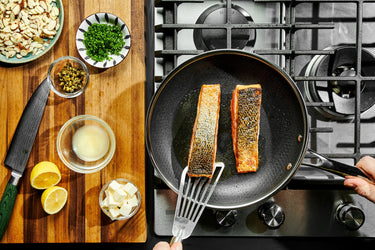5 Useful Kitchen Habits Worth Developing

Cooking is about so much more than picking the right recipe or buying the best pots and pans (though those are important, too). Kitchen comfort, efficiency, and safety is also about building good habits, too. Taking the time to adjust to these five habits will likely improve your success in the kitchen and make for easier prep and cleanup, too.
Work clean
In professional kitchens, the saying “work clean” refers to more than just keeping your countertops neat and tidy (though that, of course, is crucial). Working clean means being organized and having what you need for the task at hand literally “at hand.” Whether it’s taking time to prep your ingredients—what chefs call “mise en place”—or taking 30 seconds to wipe the countertops down and load any dishes into the dishwasher between tasks, the mindset of working clean will make you a more efficient, safer cook. Making this discipline a kitchen habit is probably the most revolutionary thing you can do to become a better cook.
Set yourself up for dishwashing success
Though “working clean” does mean keeping the countertops clear and your general cooking space organized, it’s not just about cleaning. When it comes to scrubbing up, there are some habits you can develop to make your kitchen time more streamlined. First, as mentioned above, do not leave all the dishes to the very end. There’s always a minute here or there between cooking tasks during which a plate can be washed or the dishwasher can be loaded. Keep your sink area stocked with the necessary tools, too. Keep a clean sponge handy (toss ones that smell like mildew or are over two weeks old) as well as something for tougher stuff. We like steel wool, a Brillo pad, or Bar Keepers friend to get any gunk off the stainless steel parts on HexClad pans. Hate washing up? Check out our other tips to make doing the dishes so much easier.
Washing hands thoroughly after cutting chilis
Speaking of washing…There’s one kitchen habit that’s absolutely essential: washing your hands after cutting jalapeños, habaneros, or any other spicy chili. Whether you’ve sliced a few rings to top green shakshuka or showered a batch of chipotle chicken nachos with a pile of jalapeños, you’re going to want to avoid transferring that chili heat to other foods, or worse, your eyes or a cut on your hands. Instead, switch up your cutting board (or, if you only have one, wash it well, then rub the surface with a cut lemon to be extra thorough) and wash your hands with for at least 30 seconds. Use a generous amount of grease-fighting soap and work into a thick lather. You can also use lemons or vinegar on your hands to cut through the capsaicin compounds responsible for the burn.
Wear an apron
Donning an apron in the kitchen isn’t just about looking the part. Far from it—think of an apron as a tool as indispensable as your best knife. Cooking with a dull knife can lead to kitchen accidents. Same goes without an apron: grease splatters, boiling water, and rogue flares of fire from a hot grill can all easily lead to burns. An apron protects you (and your clothing, too). Getting in the habit of putting on an apron before you start cooking can even help you get into the cooking mindset, influencing your behavior.
Keep a bowl for food scraps handy
If you’re in the habit of composting to reduce food waste, you’ll be familiar with the constant back and forth to the compost bin as you cook. This isn’t just annoying or inconvenient, it can be messy too. (No one wants carrot peels stuck to the floor.) Instead, set a medium-sized bowl on the countertop next to your cutting board. Add your scraps as you go, whether you’re peeling potatoes, cracking a dozen eggs for a frittata, or picking parsley. (Or, if you’re already in the habit of making homemade stock, then set your freezer-safe zip top bag next to the worktop to add anything that’s good for stock.)





